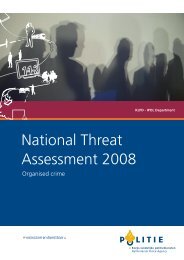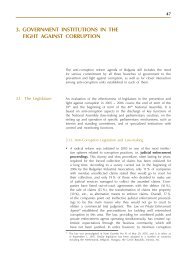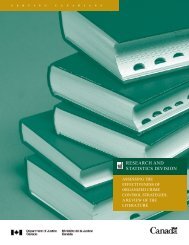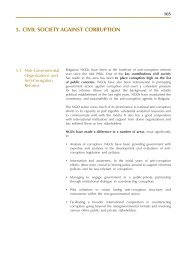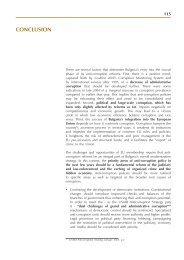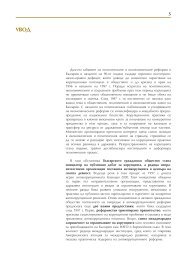Integrating Refugee and Asylum-seeking Children - Center for the ...
Integrating Refugee and Asylum-seeking Children - Center for the ...
Integrating Refugee and Asylum-seeking Children - Center for the ...
You also want an ePaper? Increase the reach of your titles
YUMPU automatically turns print PDFs into web optimized ePapers that Google loves.
comparative report: educational integration of refugee <strong>and</strong> asylum-<strong>seeking</strong> 41<br />
<strong>the</strong> education system of <strong>the</strong> receiving country. Thus,<br />
a more detailed underst<strong>and</strong>ing of <strong>the</strong> educational<br />
integration of RASC has been developed along three<br />
basic principles as part of a two-way process:<br />
1. RASC (including those with subsidiary <strong>for</strong>ms of<br />
protection) should have full access to education<br />
under <strong>the</strong> same conditions as nationals <strong>and</strong> be<br />
given <strong>the</strong> opportunity to demonstrate similar<br />
educational achievements;<br />
2. Education as a vehicle <strong>for</strong> cultural integration<br />
should fur<strong>the</strong>r effective acculturation, i.e.<br />
familiarisation of RASC with <strong>the</strong> main components<br />
of <strong>the</strong> host society’s culture;<br />
3. Unequal treatment of RASC in <strong>the</strong> education<br />
system <strong>and</strong> different <strong>for</strong>ms of discrimination<br />
(xenophobia, racism, anti-semitism, islamophobia,<br />
etc.) should be combated.<br />
A child rights approach <strong>and</strong> its underlying principles<br />
(empowerment <strong>and</strong> accountability, non-discrimination<br />
<strong>and</strong> equality, participation, indivisibility of rights,<br />
respect <strong>for</strong> <strong>the</strong> voice of <strong>the</strong> child) have been<br />
incorporated in <strong>the</strong> relevant criteria <strong>for</strong> identification<br />
of good practices of educational integration of<br />
RASC. Starting from <strong>the</strong> concept of integration we<br />
have adopted <strong>and</strong> <strong>the</strong> rights-based approach, several<br />
specific areas of analysis have been identified:<br />
1. Access <strong>and</strong> enrolment;<br />
2. Quality of education;<br />
3. Enhanced protection;<br />
4. Empowerment <strong>and</strong> participation.<br />
The research conducted by <strong>the</strong> project team<br />
has comprised all twenty-six EU Member States<br />
participating in <strong>the</strong> European <strong>Refugee</strong> Fund (ERF),<br />
as well as Denmark, Norway, <strong>and</strong> four Western<br />
Balkan states at various stages on <strong>the</strong>ir way to<br />
EU Membership (Serbia, Montenegro, Croatia <strong>and</strong><br />
Bosnia <strong>and</strong> Herzegovina). The project partners<br />
have investigated best practices in <strong>the</strong> educational<br />
integration of refugee children in <strong>the</strong>ir country as<br />
well as in several o<strong>the</strong>r European countries that are<br />
geographically <strong>and</strong>/or linguistically close to <strong>the</strong>ir<br />
own. Where <strong>the</strong> target group is relatively small (<strong>for</strong><br />
instance in Estonia), best practices in <strong>the</strong> design <strong>and</strong><br />
implementation of preparedness programmes have<br />
been reviewed. Where best practices are lacking<br />
(Bulgaria being a notable example), a situation<br />
analysis also highlighting areas needing improvement<br />
has been prepared.<br />
The main target group <strong>and</strong> direct beneficiaries of<br />
<strong>the</strong> INTEGRACE project are children who have been<br />
granted refugee status or are <strong>seeking</strong> asylum in EU<br />
Member States participating in <strong>the</strong> ERF, as well as<br />
Denmark, Norway, Serbia, Montenegro, Croatia <strong>and</strong><br />
Bosnia <strong>and</strong> Herzegovina. However, children with<br />
subsidiary protection status, temporary protection<br />
status <strong>and</strong> humanitarian residence permits have also<br />
been included as target groups. The definition of<br />
‘children’ is based on <strong>the</strong> United Nations Convention<br />
on <strong>the</strong> Rights of <strong>the</strong> Child (CRC), i.e. all persons<br />
below <strong>the</strong> age of eighteen. Unaccompanied minor<br />
migrants are also discussed, including those who<br />
have not applied <strong>for</strong> asylum.<br />
In order to collect in<strong>for</strong>mation regarding successful<br />
initiatives <strong>and</strong> policies <strong>for</strong> <strong>the</strong> educational integration<br />
of RASC, <strong>the</strong> project team used <strong>the</strong> following<br />
sources of in<strong>for</strong>mation:<br />
• academic research <strong>and</strong> publications;<br />
• reports by government institutions of EU Member<br />
States;<br />
• reports by EU institutions <strong>and</strong> agencies;<br />
• reports <strong>and</strong> studies by o<strong>the</strong>r international organisations;<br />
• reports <strong>and</strong> studies by non-governmental<br />
organisations in EU Member States;<br />
• interviews with stakeholders, conducted by<br />
telephone or in person during fact-finding visits<br />
(primary data);<br />
• on-site visits.<br />
The following methods have been used to collect<br />
data.<br />
• desktop research<br />
This involved ga<strong>the</strong>ring in<strong>for</strong>mation on background<br />
studies, stakeholder in<strong>for</strong>mation, <strong>and</strong> relevant resources<br />
<strong>for</strong> <strong>the</strong> development of data collection tools. Reports<br />
by governmental institutions in <strong>the</strong> EU Member States,<br />
legislation (international, EU <strong>and</strong> national), as well as<br />
project reports <strong>and</strong> academic research in this area<br />
have been used as a source of in<strong>for</strong>mation about<br />
policy initiatives undertaken by <strong>the</strong> countries in <strong>the</strong><br />
field of educational integration of RASC.<br />
• official correspondence<br />
The main purpose here was to collect in<strong>for</strong>mation<br />
from relevant institutions <strong>and</strong> experts on existing



